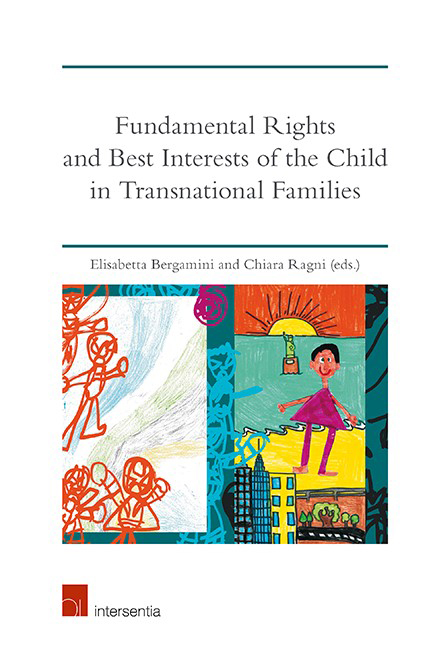Book contents
- Frontmatter
- Dedication
- Preface
- Acknowledgements
- Contents
- List of Cases
- List of Authors
- PART I THE IMPACT OF HUMAN RIGHTS AND OF THE BEST INTERESTS OF THE CHILD ON EU FREE MOVEMENT AND MIGRATION LAW
- PART II THE BEST INTERESTS OF THE CHILD AS A CONCERN OF HUMAN RIGHTS AND EUROPEAN PRIVATE INTERNATIONAL LAW
- The Place of Human Rights in the Private International Law of the Union in Family Matters
- The Best Interests of the Child Principle at the Intersection of Private International Law and Human Rights
- Recognition of a Foreign Status Filii: Pursuing the Best Interests Principle
- Surrogacy Arrangements and the Best Interests of the Child: The Case Law of the European Court of Human Rights
- Cross-Border Recognition of Adoption: Rethinking Private International Law from a Human Rights Perspective
- Protecting Children's Rights aft er Child Abduction: The Interaction of the CJEU and ECtHR in Interpreting Brussels II bis
- Cross-Border Parental Child Abduction in the EU: Is there Room for a Human Rights Exception?
- Impact of the Best Interests of the Child on the Brussels II ter Regulation
- Provisional Measures and the Best Interests of the Child in the Field of Parental Responsibility
- Index
- About the Editors
Impact of the Best Interests of the Child on the Brussels II ter Regulation
from PART II - THE BEST INTERESTS OF THE CHILD AS A CONCERN OF HUMAN RIGHTS AND EUROPEAN PRIVATE INTERNATIONAL LAW
Published online by Cambridge University Press: 12 November 2019
- Frontmatter
- Dedication
- Preface
- Acknowledgements
- Contents
- List of Cases
- List of Authors
- PART I THE IMPACT OF HUMAN RIGHTS AND OF THE BEST INTERESTS OF THE CHILD ON EU FREE MOVEMENT AND MIGRATION LAW
- PART II THE BEST INTERESTS OF THE CHILD AS A CONCERN OF HUMAN RIGHTS AND EUROPEAN PRIVATE INTERNATIONAL LAW
- The Place of Human Rights in the Private International Law of the Union in Family Matters
- The Best Interests of the Child Principle at the Intersection of Private International Law and Human Rights
- Recognition of a Foreign Status Filii: Pursuing the Best Interests Principle
- Surrogacy Arrangements and the Best Interests of the Child: The Case Law of the European Court of Human Rights
- Cross-Border Recognition of Adoption: Rethinking Private International Law from a Human Rights Perspective
- Protecting Children's Rights aft er Child Abduction: The Interaction of the CJEU and ECtHR in Interpreting Brussels II bis
- Cross-Border Parental Child Abduction in the EU: Is there Room for a Human Rights Exception?
- Impact of the Best Interests of the Child on the Brussels II ter Regulation
- Provisional Measures and the Best Interests of the Child in the Field of Parental Responsibility
- Index
- About the Editors
Summary
THE BEST INTERESTS OF THE CHILD AND THE ‘BRUSSELS II SYSTEM’ : SETTING TERMS OF REFERENCE
The best interests of the child (BIC) is the key principle of the 1989 CRC, one of most ratified treaties in the world. Article 3 of the CRC states that the best interests of the child shall be a primary consideration in all actions concerning children, and other Articles explain how the BIC shall be considered in specific situations. As a well-established principle, to what extent the BIC is an independent source of protection, for example, for migrant children, is widely debated.
Today, the BIC principle surely plays a relevant and growing role in private international law, mainly due to increasing interaction between human rights and private international law: human rights protection strongly influences the functioning of private international law rules, which are now not only interpreted coherently but also shaped to grant protection to human (and in particular children's) rights. On the other hand, the adoption of, as far as possible, uniform private international rules on matters concerning children is deemed in itself as facilitating the application and implementation of the BIC.
A second reason possibly explaining the BIC's growing relevance in private international law is the ‘irresistible extension’ of party autonomy to adults’ relationships and their ‘liberalisation’, which needs to be counterbalanced by greater attention to the protection of the BIC, with the child considered a weaker party in family relationships. Consequently, family law tends today to focus not on marriage, but on parent-child relationships.
EU private international law is developing coherently with these generally emerging global trends. Within the EU judicial area, interaction of private international law rules and fundamental freedoms makes it possible for adults to select a legal order that better satisfies their interests in personal and economic matters. Against this background, the EU's focus has shifted onto children's protection, in particular after the Lisbon Treaty: besides Member States ‘international obligations to protect the BIC derived from the CRC's ratification, today the EU itself is committed to pursuing the protection of children and their interests, as expressed in Article 3 TFEU and Article 24 of the European Charter of Fundamental Rights, which has achieved the same value as the fundamental Treaties.
- Type
- Chapter
- Information
- Publisher: IntersentiaPrint publication year: 2019
- 2
- Cited by



